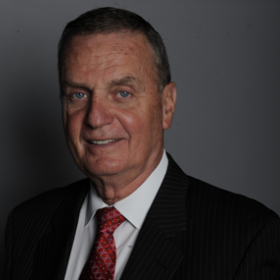
General James L. Jones for Bulgaria’s FOCUS: NATO Summit is of historical importance
EWI Board Member Gen. (ret.) James L. Jones, in his interview with FOCUS, comments on the historical importance of the recent NATO Summit in reaffirming NATO’s commitment to addressing global peace and security challenges in light of current crises in the Ukraine, Middle East and Afghanistan.
FOCUS: General Jones, what is specific about the NATO Summit, which begins today in Wales?
James L. Jones: This NATO Summit, in particular, has historical importance associated with it. It is an opportunity for NATO to reassure its commitment, particularly to such things as Article 5. It is an opportunity for the President of the United States to reaffirm the U.S. commitment to NATO. It is an opportunity to send, particularly Mr Putin, but not just him, but also other leaders in the world, a message that the NATO Alliance in the 21st century is relevant, capable, agile, and is willing to commit itself to preventing future conflicts and maintaining as much peace in the world as possible. So I think that there are some things that have to come out of this meeting that are somewhat historical and we should not miss this opportunity.
FOCUS: What could the NATO summit do about the crisis in Ukraine?
James L. Jones: The crisis in Ukraine is emblematic of the moment that we are in, in a sense that Mr Putin has shown willingness to use Russian military forces to achieve his expansionist stance. Ukraine is not a NATO member, but it is a partner country. The NATO-Ukraine Council has been working for years, as has the NATO-Russia Council. I think that the 28 countries in NATO, 26 of which are in Europe, need to come together and send a strong message that the Alliance is solid and that the repercussions and consequences that Mr Putin’s forays into expansionism will have long-lasting economic consequences.
FOCUS: How could the Summit change the relationship between NATO and Russia?
James L. Jones: I think that the relationship has already changed. I think most NATO countries consider Russia as no longer being a partner. Maybe not yet an adversary, but certainly no longer a partner. Just as recently as two years ago, there was great hope that Russia, at the end of the day, would into Euro-Atlantic arc and participate, as other countries did and benefitted economically, and with moves towards democracy. That has shown itself not to be the case, and it is now time for the Alliance to recognise Mr Putin for what he is and what he is doing, and to react accordingly.
FOCUS: The NATO leaders will discuss greater protection for Eastern Europe amid the Ukraine crisis. What concrete decisions are expected to be taken?
James L. Jones: Obviously, if the Alliance does not act as one, recognising that the threat to Eastern Europe is more imminent, than the threat to Western Europe or USA; I think that people – European, U.S., and Canadian leaders, are reminded that this has gone far enough, and it is time to stop. I was very pleased that France has decided not to sell its worships to Russia, for the time being, and I think that we need more concerted action of that type to let Mr Putin understand that this kind of behaviour is unacceptable.
FOCUS: Do you expect any concrete measures from the NATO Summit?
James L. Jones: Yes, I would be very disappointed, if the Summit comes and goes and there is no reaffirmation of the basic principles upon which NATO was founded. And a strong message that will be picked up by other organisations, like the EU, to do what is necessary to change the behaviour of the Russian President. It won’t be easy, but it can be done. I think that if there is any weakness perceived in the communiqués that come out of Cardiff, Mr Putin will exploit that, and that’s not good.
FOCUS: What decisions do you expect from the Summit regarding the threat posed by Islamic State, and regarding the withdrawal of international troops from Afghanistan?
James L. Jones: From my standpoint, NATO’s future has to be more international than just narrow trans-Atlantic issues. NATO has to be concerned about what’s going on in the Middle East. I think that NATO has very useful roles it could play in the developing world, and that NATO should recognise that the threats posed to our collective security by the recently declared Islamic State are anathema to peace and security. So, whether it’s a coalition of the willing, or NATO itself, and maybe, hopefully, some Arab allies, we have to send a strong message that we are not going to tolerate this, and we will do whatever we have to do to eradicate the ISIS – the spreading cancer that it is.
In Afghanistan we have a different problem. We need to resolve the impasse of the election of the new President. We have two good candidates. Hopefully we will work together with regardless, who becomes President. I think that very quickly the Afghan government will sign an agreement with Europe and USA on some sort of presence left behind to advise the development of the Afghan Army. I think that Mr Karzai has been so disappointing that we have a big job ahead. One of the countries that will determine the outcome in Afghanistan is the country next door – Pakistan. And so there will be a lot of work there, as well.

